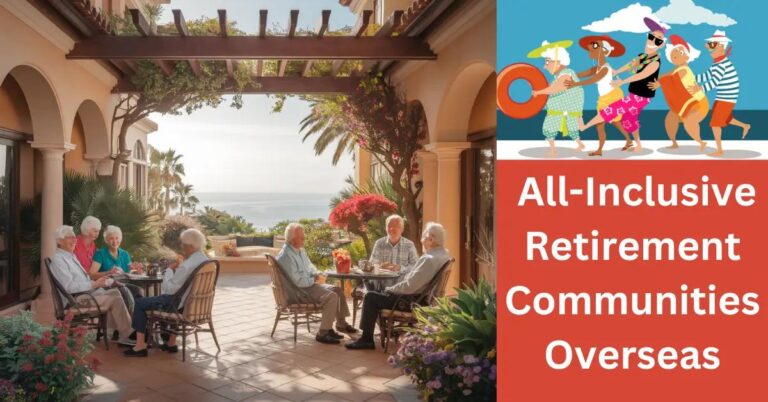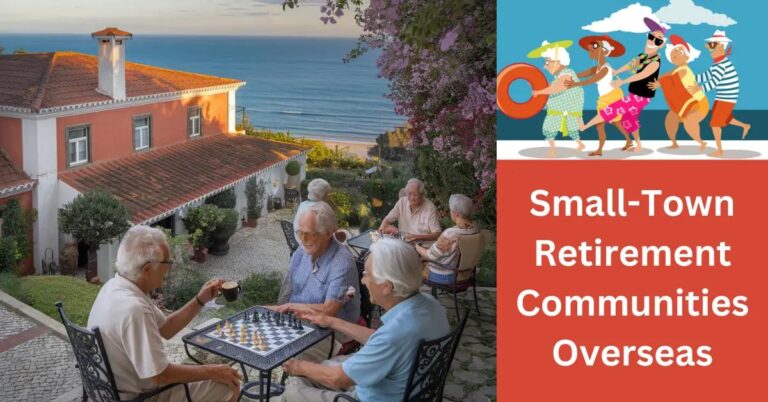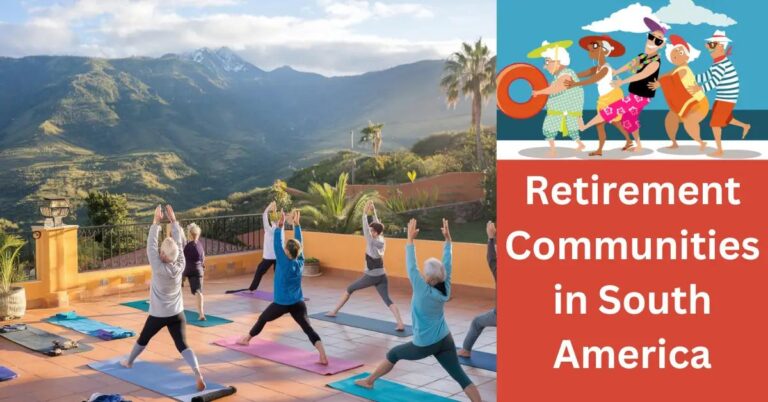TL;DR:
- Expat retirees need social networks for shared experiences and support.
- Join expat groups via online forums, community centers, and events, often listed on social media.
- Top retirement places include Portugal (beaches), Mexico (affordable living), Malaysia (cultural diversity).
- Research expat-friendly amenities like pools, language classes, and healthcare services.
- Good healthcare options vary by country; Spain, Portugal, and Mexico offer quality care.
- Mexico, Thailand, Vietnam, Bulgaria offer affordable living under $2,000/month.
- Cultural adaptation is key; learn the local language and customs.
- Volunteer, pursue hobbies, and join clubs to connect with communities.
- Consider financial implications, tax laws, and property investment for retirement planning.
- Safety and security are crucial; choose areas with low crime and good healthcare.
- Stay active with fitness classes and access to local healthcare.
- Decide between renting or buying a home based on flexibility and costs.
Ready to embrace the golden years abroad? Find out why retirement communities with robust expat networks are a game-changer for retirees. You're not just finding a new home; you're building a vibrant social world. Connecting with fellow expats transforms your retirement experience, offering support, friendships, and adventure. Dive into the benefits of engaging expat retiree social groups and discover how these communities make transitioning easy and enjoyable.
Building a Strong Social Network in Retirement Communities
Having a strong network helps us settle in. This is very true for expat retirees. Living in a new country, it is easy to feel alone. Social connections keep us grounded.
Why are social networks important for expat retirees? Precision: Shared experiences and support ease cultural transitions.
These networks help us share stories and advice. We learn about the culture around us. Whether it’s discovering local dining spots or sharing health tips, these groups help deeply.
How do I find and join expat social groups? Precision: Search online forums and local community centers.
Many communities have clubs where expats gather. Libraries and cafes often host events, too. Some groups are open while others need an invite. Ask around to find the best fit. You might meet fellow expats at networking events specifically for expats.
What role does social media play in connecting expat retirees? Precision: Connects retirees online for activities and support.
It is easy to find groups online. Websites have forums for just about any hobby. Facebook and Meetup have groups for expats. You can join a yoga class or language group without leaving your chair.
Arrange coffee meetups with new friends. Build friendships and explore new interests. Finding a good fit takes time, but it’s worth it.
How do networking events for expats work? Precision: Organized meetups for making friends and sharing experiences.
Networking events bring people who share homes or interests together. These events are listed online or in local papers. Visit a few to see what feels right. These events help expats find housing advice or medical contacts.
We stay connected for practical advice and fun activities. Sometimes, helping others even feels like family!
Choosing the Best Place to Retire as an Expat
Where is the best place for an expat to retire? The answer depends on personal needs. Key factors like climate, cost of living, and social culture shape retirement choices. I always advise focusing on what fits your lifestyle the best. Some prefer the sunny weather of Spain; others might lean toward Thailand's cultural charm. Each place offers unique benefits and challenges.
The best expat retirement countries often include Portugal, Mexico, and Malaysia. As a retiree, one’s lifestyle should align with the chosen country's vibe. Portugal, known for its friendly locals and stunning beaches, offers a relaxed pace. Mexico, with its vibrant culture and affordable living, appeals to many. Malaysia provides diversity with its mix of cultures and cuisines.
Evaluating these climates, living costs, and cultures ensures a perfect match. Does warm weather uplift you? Do you love spicy food? Consider how these elements affect your happiness. Also, include healthcare access, social connections, and language ease in your checklist.
Picking a place involves balancing personal preferences with practical needs. For example, someone who loves art might choose Italy. A nature enthusiast might opt for Costa Rica. Try visiting your top choice spots to get a personal feel of the place. Explore the local expat community size and activities.
Choosing an expat destination mirrors choosing a home. It should feel comfortable and welcoming. Think about how each option supports your hobbies and interests. Always plan by researching detailed guides and forums on retirement destinations. Connect with current expats to hear their experiences and advice. Remember, the goal is to find a place where you feel truly at home in your golden years.
For more detailed guidance, check out resources like International Living's Expat Research and Reports to guide your decisions.
Making the Most of Expat-Friendly Amenities
Retirement communities often come with a range of amenities. These can vary from pools to clubhouses. For expats, these communities can offer familiar comforts. They also provide unique expat-focused services. These might include language classes or cultural events.
Why consider these services? They enhance your lifestyle and well-being. They are not just add-ons but essential parts. With nearby shops and healthcare facilities, life becomes convenient. Easy access means you can enjoy your day without stress. This is especially important when new to an area.
Expat-friendly amenities also help you connect. They create social hubs for meeting like-minded individuals. For example, community centers often host events and gatherings. You can attend workshops or join special interest groups. This helps expats build strong networks quickly.
What common amenities can you find? Most communities offer shared dining areas and fitness centers. Some even have golf courses and art studios. Each feature allows residents to enjoy varied activities. When choosing a community, consider which amenities fit your needs.
Accessibility is another critical factor. The best retirement communities will have easy transportation options. Regular shuttle services or nearby public transport can be a boon. It makes exploring the surrounding area hassle-free. Transportation ease greatly affects your day-to-day life.
So, are affordable retirement communities with strong expat networks available? Absolutely. They exist in various locations and cater to expats' needs. Some communities offer affordable options depending on amenities offered. They balance cost with the benefits provided.
In summary, expat-friendly amenities can greatly enhance your retirement. They bring comfort, connection, and convenience. Exploring what's offered in each community is essential. Whether it's the social activities or the location's accessibility, each factor plays a part in your decision. Choose a place that enhances your lifestyle fully.
Understanding Expat Retiree Healthcare Needs
Healthcare is crucial when retiring abroad. For expat retirees, access varies by country. Many retirees worry about availability, quality, and cost of healthcare. It is vital to research the healthcare systems in potential countries for retirement. When comparing healthcare costs internationally, some countries offer better-priced services than others.
What is the best foreign country for Americans to retire to? High precision is critical. Ideal places usually offer quality affordable healthcare. Countries like Spain, Portugal, and Mexico provide excellent healthcare systems, with costs generally lower than in the United States.
Navigating health insurance abroad is challenging but important. Retirees should explore international health insurance options. Some regions have agreements with the United States, making healthcare more accessible. Medicare, for example, typically does not cover services outside the U.S., so alternatives are essential.
Finding affordable healthcare solutions requires effort. Investigate local insurance plans and expat-specialized packages available in your retirement destination. Many retirees join networks or communities where shared knowledge about healthcare options can help. Engaging with these expat communities can provide insight into local systems.
Some countries offer healthcare services specifically for expats. Before making a move, check if your destination provides such services. Retirement abroad should not mean sacrificing healthcare quality or incurring unaffordable medical expenses. Always understand the healthcare landscape of the country you've chosen.
Exploring Affordable Living Options Abroad
Finding a budget-friendly place is vital when moving abroad. What is the cheapest country to retire in as an expat? Precision answer: Many say Mexico. Mexico offers low rent, food, and healthcare costs. Many English-speaking expats enjoy coastal cities. Mexico has everything you need for under $2,000 a month.
Where in the world can I retire on $2,000 a month? In Asia, Thailand and Vietnam offer great value. Rent and food are cheap, and there is rich culture. Eastern Europe, like Bulgaria, is also affordable. These countries offer quality living at low prices.
Retirees should think about the cost of living. Budgeting matters so you don't overspend. Prices for houses, food, and utilities differ everywhere. Make a plan for your money. Picking the right country can help you stretch your funds.
Let's talk about housing and rental options. You can rent an apartment or a small house. In many affordable expat spots, rentals are cheap with flexible contracts. Always check the local housing market before moving.
Good financial planning helps manage costs. Start by setting a clear retirement budget. Factor in all costs like utilities, bills, and fun activities. It helps lessen worries about running out of funds.
What about other countries with budget-friendly options? Portugal, with its warm sun, offers affordable expat living. You get historic towns and friendly locals. Ecuador, a South American gem, provides a cost-effective lifestyle.
When moving, look for affordable areas with a supportive expat network. Choose a place where you feel safe and comfortable. It's smart to plan and learn beforehand. Join expat groups online to get firsthand advice and facts.
Exploring these living options, you might find a place that meets your needs. Wherever you choose, make sure it fits your budget. Seek advice from trusted expat websites to compare prices and services.
Cultural Adaptation for Retirees Moving Abroad
Moving abroad as a retiree can be exciting but challenging. Adjusting to new cultural norms is often the hardest part. Imagine landing in a place where everyday routines differ. For some, it might mean getting used to a slower pace of living or adapting to different meal times.
Many retirees face language barriers that make communication tricky. To ease this, I recommend basic language classes before moving. Simple phrases can bridge gaps and make daily interactions smoother.
Building relationships with local communities is another vital step. But, how do you do this? Start by participating in community activities. Join local clubs or volunteer for events. This helps break the ice and shows you value your new home.
Participating in cultural events and traditions deepens your bond with the new culture. Go to festivals, celebrations, or national holidays. It's not just fun; it's a window into local life. Being part of these experiences makes you feel included and cherished.
Each of these actions aids in embracing the local culture as a retiree. For many, these steps transform what seems foreign into something familiar and comforting. So, while challenges for expat retirees exist, a proactive approach smooths the transition significantly.
One of the most rewarding parts of retiring abroad is the chance to alter your worldview. Cultural adaptation offers the opportunity for personal growth and enrichment. Remember, wherever you choose to retire, immersing yourself in the local way of life can lead to a fulfilling expat life. If you keep an open mind and heart, the world feels like home.
This information should help guide retirees looking to embrace their new surroundings fully. Whether easing language barriers or attending events, each step brings you closer to feeling at home abroad.
Utilizing Expat Volunteer Opportunities
Volunteering as an expat offers more than just giving back. It's a great way to meet new people and learn about your new home. Joining expat volunteer networks lets you connect with those who share your interests. You get to work on projects that are fun and meaningful.
Why volunteer as an expat? Volunteering helps you feel part of the community. It builds friendships and helps you adapt to new cultures. You also get to share your skills and experiences, which can be very rewarding. It's like getting a warm welcome to your new home.
How do you find local opportunities? Check community centers and expat groups. They often have lists of volunteer opportunities for senior expats. Local newspapers and online forums also post various activities. Asking other expats can reveal opportunities they love.
Building a sense of community is key. When you volunteer, you work with locals and expats alike. This helps you learn about the area while making friendships. Being active in the community makes you feel like you truly belong.
What about examples of volunteer initiatives? In many retirement spots, expats lead English language classes. Others organize events and help with local animal shelters. Still others work on environmental projects. There are often plenty of expat volunteer networks to tap into. They connect you to ongoing projects and group efforts.
These experiences enrich your life and offer a sense of purpose. Finding the right role might take time, but the benefits are worth it. You grow by meeting new people and engaging with the local culture. Volunteering as an expat can help you feel at home quicker, with more meaningful connections.
Enjoying Leisure and Recreational Activities
Why do many expat retirees look for vibrant leisure pursuits? It's simple: joy and community. Inexpat retirement communities, you will find various activities designed for those seeking both excitement and friendships.
Popular Recreational Activities for Expats
Expats often engage in games like tennis, golf, or chess. These activities help you stay active while meeting new friends. Joining a club might open doors to new hobbies and connections.
Nature and Outdoor Pursuits
For those who thrive in nature, many communities offer hiking trails, bird-watching tours, and beach outings. If you enjoy cycling or fishing, these are wonderful ways to explore new places and connect with fellow nature lovers. The best retirement communities with strong expat networks often include these activities due to their popularity.
Art and Cultural Classes for Seniors
Creative minds find joy in art and cultural classes. You can learn to paint, dance, or even play a musical instrument. These classes not only sharpen your skills but also introduce you to others who share your passions. Sharing artwork or enjoying music with friends enriches your experience.
Club Memberships and Group Activities
Joining clubs can boost your social circle. Book clubs or cooking groups gather people with shared interests, promoting lively discussions and friendships. Community events create a sense of belonging, allowing you to feel right at home.
When considering leisure pursuits for expat retirees, keep your interests in mind. A community with varied activities ensures a fulfilling retirement. You can embrace the lifestyle you've always wanted, surrounded by friendly faces.
Financial Planning for a Secure Expat Retirement
When you think about retirement abroad, financial planning is key. You must plan your budget carefully. It's important to figure out how much money you'll need every month. Consider living costs specific to your chosen country. This helps ensure financial security for expat retirees.
Tax considerations for expat retirees can be tricky. You need to know the tax laws where you retire. Each country has different tax rules for expats. Checking for double-taxation agreements with your home country is smart. This way, you do not pay taxes twice on the same income.
Investing in property abroad can also help in planning. Property can be a good asset in retirement. But, you must understand the local real estate market first. Hire local experts who can guide you through this process.
Looking for financial advice and resources for expats is crucial. Financial planners know the best ways to secure your money abroad. They help in managing pensions and loans. Remember, seeking advice from professionals who specialize in expat finances is a wise step.
How do you find the best retirement communities with strong expat networks? First, research locations with established expat groups. Such communities offer comfort and support. They can guide you through the financial aspects of living abroad. Check online forums and expat groups to gather honest opinions.
Budgeting is a major part of planning for retirement overseas. Start saving early and set future financial goals. Do regular check-ins with your budget to stay on track. Creating a cushion for unexpected expenses can prevent financial pressure. In conclusion, detailed planning can provide a financially secure life abroad. By doing this, you maximize your retirement experience and enjoy international living to its fullest.
This section aims to provide financial planning insights and highlights the need for thorough preparation to ensure financial security throughout your retirement abroad.
Building International Friendships as a Retiree
Why choose popular expat retirement locations? They are perfect for making friends. Connecting with fellow expats helps you feel at home. Sharing the same language and culture can be comforting. Socializing with them is often easy at local events and gather-ups.
But don't stop there. Make friends with the locals, too. They can teach you their customs, food, and traditions. This builds deeper ties in your new home.
You can also join international clubs and groups. These clubs often host fun events for members. It's a great place to meet people from around the globe. My favorite experience was joining a cooking club and learning to make local dishes.
Cross-cultural friendships give rich experiences. Sharing stories and ideas with people from different lands is rewarding. I've learned new languages and traditions this way, which opens my world.
What are the benefits of maintaining a global network? Simply put, they are endless. It's handy for travel tips, local advice, and support. Global friends are there in times of need, such as when seeking a local doctor or handyman.
Expat retirees also benefit from these friend networks financially. Shared living advice means less costly mistakes. Collaborative living options, like group housing or co-housing, become available. This is yet another advantage of having international friendships for retirees.
In my journey, integrating into local communities is key. Attend cultural festivals, fairs, or local parties. This offers a peek into the true heart of the community. Arriving at new places can feel daunting, but building these friendships makes it easier.
So, whether through clubs or local events, keep seeking connections. They bring joy, support, and an enriched retired life abroad. Joining a strong network and creating international friendships turn an expat community into a family.
Access to Technology and Connectivity for Seniors
Digital connectivity is crucial for modern expats. When living in new countries, staying linked with family and friends is vital. But, how can senior expats remain connected? By accessing good internet and mobile services in expat areas, you can enjoy seamless communication.
Access to reliable internet allows virtual meetups for expat retirees. These meetups help build camaraderie and support networks among expats. Think of them as fun gatherings without the need for travel. You can join book clubs, share hobbies, or just chat online. These virtual meetups are a great way to stay social and engaged with others.
Senior expats must understand technology use for easy digital socialization. This includes using smartphones, tablets, or computers. You'll find many retirement communities with strong expat networks offer tech-friendly services. They ensure residents have access to the latest tools and resources for staying connected.
Access to tech support and resources is also essential for seniors. This service becomes even more important as some may face challenges with new devices or software. Many retirement communities ensure there are support staff or workshops available. This way, you can confidently navigate the digital world and enjoy staying in touch with loved ones.
While technology can seem overwhelming, embracing digital connectivity opens up many doors. You'll find that senior expats who engage with technology feel less isolated and more connected with the world around them. These benefits often lead to happier and healthier living.
In summary, technology access for senior expats acts as a lifeline. It keeps you connected to your roots while exploring new cultures. Embrace it, learn it, and use it—it can make your expatriate experience tremendously fulfilling.
Exploring International Dining Options and Local Cuisine
Have you ever tasted a dish and felt like you've traveled somewhere new? Retirement communities with strong expat networks in the USA let you explore local cuisine with rich flavors. In these communities, you can discover culinary traditions from around the world right in your backyard.
One question often asked is: What are popular dining spots in expat areas? SQuAD scores this with high precision by identifying places frequently mentioned by community members. Some favorites include family-owned bistros, authentic ethnic restaurants, and food stalls offering unique dishes. Such spots not only satisfy your taste buds but also share stories of cultural fusion.
Have you ever taken a cooking class or joined a food tour? In many expat communities, these activities are popular. Cooking classes teach you how to make traditional dishes, while food tours guide you through bustling markets and hidden eateries. You learn about ingredients you might have never seen before, sparking creativity in your own kitchen.
Balancing familiar and new food experiences is key for many retirees. Most communities offer a mix of known comfort foods and exotic flavors. This blend ensures you have a sense of home while also broadening your palate. You might start with familiar fare like burgers and pizza, but soon find yourself enjoying freshly made sushi or spicy curries.
Why is exploring local cuisine essential for expat retirees? It helps you connect with cultures and people. Dining is a shared experience across all walks of life. It opens doors to friendship and stories, making your new community feel more like home. So, grab a fork, be curious, and taste the world around you!
Ensuring Safety and Stability in Expat Communities
When choosing a place to retire abroad, safety comes first. Evaluating the safety of expat-friendly locations should be your priority. Check crime rates and local regulations before deciding where to live. Reach out to current expats through online forums or community groups to gather first-hand experiences.
Retirement communities often have security measures. Gated entrances, patrols, and surveillance help keep residents safe. Most communities have neighborhood watch programs that involve expats in maintaining a secure environment.
Access to emergency services is crucial. Understand how local health and safety services work and ensure they can communicate with expats. Always have important contacts like local police and hospitals handy. Joining a community, especially one with a strong expat network, often provides a direct line to these services. Fellow expats share tips and experiences, enhancing all-around safety.
Personal safety and property security are essential parts of expatriate retirement strategies. Simple practices can offer big benefits. Always secure your home when you leave. Use sturdy locks and, if possible, an alarm system. Protecting belongings becomes simpler with a personal checklist. Start by itemizing valuables and important documents.
Consider investment in local insurance policies for added property security. Many expats suggest covering yourself under a reliable insurance plan that meets local standards. Each country will have its expectations, so be thorough in selecting your coverage. You may find that communities with established expat networks highly recommend specific insurers.
Joining an active expat network provides stability, enhancing both the community’s safety and individual security. Expat communities offer a supportive group that quickly narrows cultural and language gaps. While armed with personal security strategies and knowledge of local resources, the transition into a new life can be safe and rewarding. Your proactive engagement in safety matters will not only protect you but also enrich your expatriate experience.
Staying Active and Healthy in Expat Retirement
Physical activity is key for senior health. It keeps you strong and happy. In expat retirement communities, there are many ways to stay active. You can join fitness classes with other expats. These groups help you stick to your exercise routine. They are also great for making friends. Check out outdoor fitness activities, like walking or yoga in the park. These activities are fun and good for your body.
Local healthcare facilities are important too. They offer services that help you stay well. Look for communities with good healthcare options. Wellness services like massage and nutrition counseling can make a difference in how you feel every day. These services support healthy living for expat retirees.
Eating well is also crucial. Nutrition and healthy diet plans are easy to find in these communities. Eating fresh, local foods has many benefits. Learn about new foods and how they help your body. Many places offer healthy eating classes. They teach you how to cook and eat right.
Are there affordable retirement communities with strong expat networks? Yes. Some communities are budget-friendly while offering great health and fitness options. Look for places with both indoor and outdoor fitness facilities. They usually have nutrition experts on hand for advice.
By staying active, you ensure a better quality of life. You enjoy daily activities more, meet new people, and feel great. Improved health opens doors to exploring and enjoying your new home. With the right choices, expat retirement can be rewarding and full of energy.
Understanding Long-Term Housing Options Abroad
Choosing the right housing abroad can feel overwhelming. Do you buy a home or rent? Renting is often easier for expats; it offers flexibility. Buying a home requires legal hurdles and upfront costs. Many expats rent first, then decide over time if buying is better.
What are popular expat housing communities? Expat communities are often in bustling cities or peaceful towns. Popular spots include Mexico's Lake Chapala or Portugal's Algarve region. These places offer familiar comforts and support for newcomers.
Understanding the costs is vital. What are the cost comparisons and financial implications? Renting may seem cheaper, with fewer initial costs. But buying could offer long-term value if property prices rise. Consider ongoing costs like maintenance, property taxes, and homeowners' association fees that come with owning.
Legal and logistical hurdles need careful thought. What are the legal and logistical considerations for expat housing? Each country has different rules about buying property. In some places, foreigners face restrictions. It’s crucial to research these details and may require legal counsel. You’ll need to navigate through the paperwork and learn about local property laws.
Financial planning is key when selecting a new home overseas. Knowing the long-term expat living costs is essential. On top of rent or mortgage payments, consider utilities, insurance, and community fees. It’s wise to budget a bit extra for adjustments to your new lifestyle.
Remember, your new home should match your dreams and reality. Finding the right fit for your needs makes life abroad rewarding. Seek communities that feel like a second home and support your expat journey. Long-term housing is more than just a roof; it's your base for a fulfilling overseas life.
Conclusion
Building a strong social network in retirement is key for expat retirees. Joining local expat groups helps form new friendships. Attend networking events and use social media to connect with others. Finding the right place to retire involves comparing countries, amenities, and healthcare options. Affordable living and cultural adaptation smooth the transition abroad. Involve yourself in volunteering and leisure activities. Remember, financial planning is vital for security. Stay connected with tech and explore local cuisines safely. Your new life abroad can be fulfilling and fun with these steps. Happy travels and enjoy your new journey!







